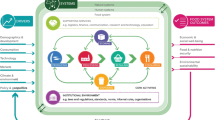Abstract
Black agrarian movements in the US have variously worked towards gaining equality within broader society and access to resources from dominant institutions as well as separation and independence from dominant systems and the creation of alternative institutions and structures. Often associated with different groups or movements, these differing tactical approaches are at times at odds, creating fissures between groups or movements or tensions among individuals. But they also can be used as complementary tactics towards a long-term vision of developing alternative socio-economic systems.
This paper explores how a plurality of rural development tactics manifests within a single organization using the Federation of Southern Cooperatives/Land Assistance Fund (Federation) as a case study. More narrowly, this paper examines a specific on-the-ground configuration of organizers and farmers working with the Federation who are using goat farming as a tool for rural development in western Alabama. By focusing on the practices, expressed goals, and interactions of the people involved in one particular effort, this paper shows plurality to be a quality that is tactically useful for (1) navigating between a long-term strategic vision and the pragmatic survival within the current system and (2) building strategic coherence while respecting individual differences. Drawing on ethnographic research, this paper focuses on the practiced and relational ways farmers and organizers work to synthesize the plurality embedded within the Federation’s Black development ideology in order to build sustainable and effective forms of change.
Similar content being viewed by others
Notes
This paper does not deal directly with the works of Booker T. Washington and W.E.B. Du Bois, but rather notes the way they were used as a shorthand. There is a wide range of scholarship on the works of both. For instances, see Thomas Aiellos’s “The Battle for the Souls of Black Folk” (2016), Manning Marable’s “W.E.B. Du Bois: Black Radical Democrat” (1986), or articles by Robert Brown (2011) or J.R. Pole (1974) among others.
The USDA defines small farms as any operation with less than $250,000 gross cash farm income. Many of the goat farmers working with the RTRC had between 5–40 acres of land, and far less than $250,000 gross cash farm income.
Socially disadvantaged is a term used by the USDA to indicate the impact of social factors, such as racism, on farmers’ success.
In the US, the Morrill Act of 1862 provided grants of land to states for the establishment of universities that would be dedicated to using research in support of surrounding farmers and industries. These 1862 land-grant universities still have the mission of extension and outreach. In the South, these universities were segregated, leading the federal government to offer some funding for the support of additional universities for African Americans. These are the 1890 land-grant universities. Later, additional funding was also used to support tribal universities with the same mission.
Silvopasture integrates timber and livestock on the same land.
This was a national program, but since it was focused on small-holding and limited resource farmers the program was directed more towards regions with these types of farmers, such as the southeastern US.
References
Ali OH (2014) Black Populism: Agrarian Politics from the Colored Alliance to the People’s Party. In: Reid DA, Bennett EP (eds) Beyond Forty Acres and a Mule: African American Landowning Families since Reconstruction. Gainesville: University of Florida Press, pp 109–131
Ashmore SY (2008) Carry It On: The War on Poverty and the Civil Rights Movement in Alabama, 1964–1972. University of Georgia Press, Athens
Bethell TN (1982) Sumter County Blues: The Ordeal of the Federation of Southern Cooperatives. National Committee in Support of Community Based Organizations, Washington, DC
Bledsoe A, McCreary T, Wright W (2019) Theorizing Diverse Economies in the Context of Racial Capitalism. Geoforum. https://doi.org/10.1016/j.geoforum.2019.07.004
Bledsoe A, Wright WJ (2019) The pluralities of black geographies. Antipode 51(2):419–437
Brooks J (1979) The Emergency Land Fund: A Rural Land Retention and Development Model. In: McGee L, Boone R (eds) Black Rural Landowner - Endangered Species. Greenwood Press, Westport, pp 115–134
Brosius PJ (1997) Endangered forest, endangered people: environmentalist representations of indigenous knowledge. Hum Ecol 25(1):47–69
Browne RS (1971) The constellation of politics and economics: a dynamic duo in the black economy. Rev Black Polit Economy 2(1):44–55
Browne RS (1968) The Case for Black Separatism. CrossCurrents. 18(4):46–51
Buchanan I (2021) Assemblage Theory and Method. Bloomsbury Academic, New York
Cleaver F (1999) Paradoxes of participation: questioning participatory approaches to development. J Int Dev 11(4):597
Conway J, Singh J (2011) Radical democracy in Global Perspective: notes from the pluriverse. Third World Quarterly 32(4):689–706
Cooke B, Kothari U (2001) Participation: the New Tyranny? Zed Books, London
Daniel P (2013) Dispossession: Discrimination Against African American Farmers in the Age of Civil Rights. The University of North Carolina, Chapel Hill
de Jong G (2005) Staying in place: black migration, the civil rights movement, and the war on poverty in the rural South. J Afr Am Hist 90(4):387–409
de Sardan JPO (2005) Anthropology and Development: Understanding Contemporary Social Change. Zed Books, London
Deleuze G, Guattari F (1988) A Thousand Plateaus: Capitalism and schizophrenia. Bloomsbury Publishing, London
Escobar A (1995) Encountering Development: The Making and Unmaking of the Third World. Princeton University Press, Princeton, NJ
Escobar A (2000) Beyond the search for a paradigm? Post-development and beyond. Development, 43(4): 11–14
Federation of Southern Cooperatives/ Land Assistance Fund (2021) Building Back Cooperatively: Retooling for a New Economy. Annual Report
Ferguson J (1985) The Anti-politics Machine: “Development,” Depoliticization, and Bureaucratic Power in Lesotho. U of Minnesota Press, Minneapolis
Franzen S (2017a) Framing nature: visual representations of ecological paradigms. Renew Agricul Food Syst 33(3):256–258
Franzen S (2017b) Reality education: agricultural knowledge exchange in the US South. J Agricul Food Syst Commun Develop 7(2):69–83
Franzen S (2020) The value of farming: multi-faceted wealth generation through cooperative development. Econom Anthropol 7(2):279–292
Gardner K, Lewis D (1996) Anthropology, Development and the Post-Modern Challenge. Pluto Press, Chicago
Gilbert J, Sharp G, Felin MS (2002) The loss and persistence of black-owned farms and farmland: A review of the research literature and its implications. South Rural Sociol 18(2):1–30
Gordon NJ (2014) Collective courage: A History of African American Cooperative Economic Thought and Practice. University Park: Penn State University Press
Gow D (2008) Countering Development: Indigenous Modernity and the Moral Imagination. Duke University Press, Durham
Kothari A, Salleh A, Escobar A, Demaria F, Acosta A (2019) Pluriverse: A Post-Development Dictionary. Tulika Books, New Delhi
Li TM (2007) The Will to Improve: Governmentality, development, and the practice of politics. Duke University Press, Durham
McCutcheon P (2011) Community Food Security “For Us, By Us”: The Nation of Islam and the Pan African Orthodox Christian Church. In: Alkon AH (ed) Cultivating Food Justice. Julian. The MIT Press, Agyeman, pp 177–196
McCutcheon P (2019) Fannie Lou Hamer’s freedom farms and black agrarian Geographies. Antipode 51(1):207–224
Mosse D (2004) Cultivating Development: An Ethnography of Aid Policy and Practice. Pluto Press, London
National Agricultural Statistics Service (NASS). (2019). Census of Agriculture Highlights: Black Producers. ACH17–9. Washington D.C
Oslender U (2019) Geographies of the pluriverse: Decolonial thinking and ontological conflict on Colombia’s Pacific coast. Ann Am Assoc Geogr 109(6):1691–1705
Petty AM (2013) Standing Their Ground: Small Farmers in North Carolina since the Civil War. Oxford University Press, New York
Pieterse JN (2000) After post-development. Third world quarterly, 21(2), 175-191
Redi DA (2014) Introduction. In: Reid DA, Bennett EP (eds) Beyond Forty Acres and a Mule: African American Landowning Families since Reconstruction. University of, Florida, pp 1–20
Reynolds B (2003) Black Farmers in America, 1865–2000: The Pursuit of Independent Farming and the Role of Cooperatives. United States Department of Agriculture, Washington, DC
Richards P (1985) Indigenous Agricultural Revolution: Ecology and food production in West Africa. Westview Press, London
Roll J (2014) “The Lazarus of American Farmers”: The politics of Black Agrarianism in the Jim Crow South, 1921–1938. In: Reid DA, Bennett EP (eds) Beyond Forty Acres and a Mule: African American Landowning Families since Reconstruction. University of, Florida, pp 132–154
Schroeder RA (1999) Shady Practices: Agroforestry and Gender Politics in the Gambia. University of California Press, Berkeley
Scott JC (1998) Seeing Like a State: How certain schemes to improve the human condition have failed. Yale University Press, New Haven
Slaughter, J. (1992). New Battles Over Dixie: The Campaign for a New South. Rowman & Littlefield.
White MM (2018) Freedom Farmers: Agricultural Resistance and the Black Freedom Movement. Chapel Hill: University of North Carolina Press
Womack VL (2014) Black Power in the Alabama Black Belt to the 1970s. In: Reid DA, Bennett EP (eds) Beyond Forty Acres and a Mule: African American Landowning Families since Reconstruction. University of, Florida, pp 2331–3253
Wood SD, Gilbert J (2000) Returning African American farmers to the land: Recent trends and a policy rationale. Rev Black Polit Economy 27(4):43–64
Woods CA (2017[1998]). Development Arrested: The Blues and Plantation Power in the Mississippi Delta. Brooklyn: Verso
Wright WJ, McCreary T, Williams B, Bledsoe A (2020) Race, Land, and the Law: Black Farmers and the Limits of a Politics of Recognition. In: Garth H, Reese AM (eds) Black Food Matters: Racial Justice in the Wake of Food Justice. University of Minnesota, Press, pp 228–250
Ziai A (2004) The ambivalence of post-development: between reactionary populism and radical democracy. Third World Quarterly 25(6):1045–1060
Funding
This study was funded by the race and difference initiative, Emory University, Emory College of Arts and Sciences, Emory University.
Author information
Authors and Affiliations
Corresponding author
Additional information
Publisher's Note
Springer Nature remains neutral with regard to jurisdictional claims in published maps and institutional affiliations.
Handled by Shivani Kaul, Royal University of Bhutan, Bhutan.
Rights and permissions
About this article
Cite this article
Franzen, S. Plurality in black rural development. Sustain Sci 17, 1247–1261 (2022). https://doi.org/10.1007/s11625-022-01153-8
Received:
Accepted:
Published:
Issue Date:
DOI: https://doi.org/10.1007/s11625-022-01153-8




